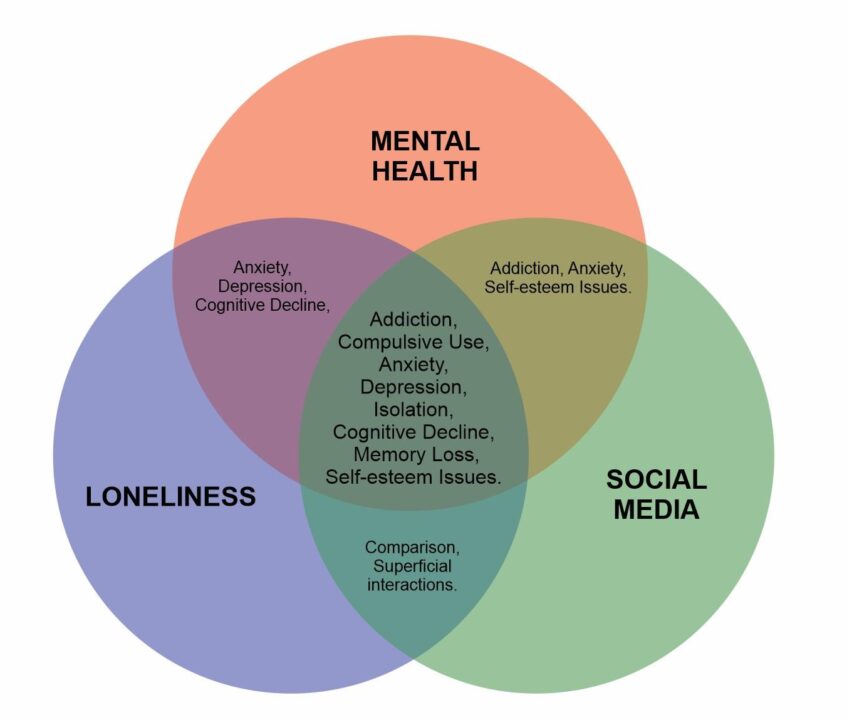Image by Freepik
While platforms like Snapchat, Instagram, and Facebook offer unprecedented opportunities for connection, they also contribute to a growing mental health crisis. Recent regulatory proposals, such as the U.S. Surgeon General’s call for a warning label and Canada’s ban on Snapchat, reflect a broader recognition of the pressing need to address these issues at both the policy and grassroots community levels. Moving forward, a multifaceted approach will be essential to mitigating the negative effects of social media on mental health; the goal is to foster a more connected, healthier society.
This post raises awareness of the urgent need to reduce the time spent on social media engagement and how to achieve a healthier relationship with our platforms of choice. It underscores the dissertation work by one of the authors on the interplay between social identity formation and social media adoption.

The intersection of loneliness, social media, and mental health (Nzeribe 2024)
The diagram above illustrates the cyclical relationship between loneliness, social media, and mental health, where each one feeds into the other, worsening the situation for individuals.
Loneliness and Its Mental Health Impacts
Loneliness is an emotional state defined by the gap between the social connections people desire and the actual reality they experience. Its impact on mental health is profound. Prolonged loneliness can lead to anxiety, depression, and even suicidal tendencies. Research shows that individuals experiencing chronic loneliness are also more likely to suffer from cognitive decline and memory loss. This highlights how loneliness can affect both mental and physical health.
Social isolation — a related but distinct concept — also worsens health outcomes. Individuals who are socially isolated are more likely to suffer from heart disease, stroke, and other physical health challenges. It is estimated that one in four people globally experience significant loneliness. As social media becomes more ingrained in everyday life, concerns arise about its role in deepening this public health issue.
The Paradox of Social Media
Social media is marketed as a tool for fostering connection, but research suggests it can lead to heightened feelings of loneliness. Constant exposure to curated versions of other people’s lives leads users to compare their own lives, often resulting in feelings of inadequacy and inferiority. The pressure to present an idealized self-image and the addictive nature of social media platforms designed to keep users engaged can create a cycle of loneliness and anxiety.
Platforms like Instagram, Facebook, and TikTok thrive on the “attention economy,” in which user engagement translates to profitability. Algorithms prioritize content that keeps users scrolling, often pushing material that evokes emotional responses — either positive or negative. This constant feedback loop can lead to compulsive use, further isolating individuals from meaningful, face-to-face social interactions.
U.S. Surgeon General’s Call for Regulatory Action
Recognizing the mental health risks tied to excessive social media usage, U.S. Surgeon General Dr. Vivek Murthy has advocated for policy intervention. In May 2023, Dr. Murthy proposed a Tobacco-like warning label on social media platforms to raise awareness of the potential mental health risks. Senators Marsha Blackburn and Richard Blumenthal have backed the proposal, highlighting the bipartisan concern over social media’s impact on young people in particular.
The proposed warning label would mirror those used on tobacco products, educating users about the risks of prolonged social media engagement. While such a measure would mark a significant step forward, some mental health experts agree that more comprehensive approaches are necessary to address the root causes of social media-induced mental health problems.
Recent Global Policy Changes: Canada’s Ban on Snapchat
As concerns around social media’s impact grow, countries like Canada are taking action. In September 2024, Canada imposed a temporary ban on Snapchat, citing concerns over privacy violations and its role in contributing to youth mental health issues. The move was widely seen as a response to mounting evidence that the platform’s design — which was centered around disappearing messages and quick dopamine hits — was encouraging addictive behaviors in young users.
The Canadian government’s decision to ban Snapchat highlights a growing trend among policymakers worldwide. As public awareness of the mental health risks associated with social media rises, governments are becoming more proactive in regulating how these platforms operate. Social media companies are now facing increasing scrutiny, prompting many countries to consider stricter regulations to protect users, especially minors, from harmful online behavior.
The Social Aspects of Loneliness
Loneliness also has significant social implications. People who are lonely may withdraw from their communities. This withdrawal can negatively affect the individual and the broader society because communities with high levels of loneliness often experience reduced social cohesion and increased rates of mental illness.
From a sociological standpoint, loneliness can be understood through symbolic interactionism, a theory that examines how people derive meaning from their interactions with others. Through constant feedback loops of likes, comments, and shares, social media platforms create spaces where individuals are continuously negotiating their social identity. However, these platforms often offer superficial validation, leading many users to feel even more disconnected from real-world relationships.
Broader Health Implications
Beyond mental health, loneliness, and social isolation can affect physical well-being. Research indicates that loneliness raises levels of cortisol, a stress hormone that suppresses immune function, thereby increasing the risk of illness. Social isolation can also hinder individuals from obtaining important healthcare services. Those living alone, for instance, may delay seeking medical care due to a lack of support, increasing their health risks.
Moving Forward: Addressing the Mental Health Crisis
The Surgeon General’s call for tobacco-style warning labels is just one step in addressing the mental health crisis linked to social media. Governments must also implement digital literacy programs that teach users, particularly adolescents, about the potential hazards of excessive social media use. Mental health professionals, educators, and community leaders must collaborate to offer support to individuals grappling with loneliness and social isolation. They can provide practical strategies and services such as therapy, support groups, and community engagement programs.
At the same time, the role of social media companies is critical. These platforms should be held accountable for their intentionally addictive and harmful design choices. It is recommended that they implement features that encourage users to take breaks, restrict usage, and engage with content that promotes well-being. These healthy measures should ultimately be the future standard and priority for the industry.
About the authors

Dr. Ngozi Onuoha, MD, MBA-HCM
Dr. Ngozi Onuoha is a Primary Care Physician who is Board-Certified in Internal medicine and Geriatric Medicine. Dr. Onuoha completed a Master’s in Business Administration in Healthcare Management at Western Governors’ University. In addition to her work as a clinician, she is passionate about helping people optimize their health goals.

Dr. Eric Nzeribe, DBA, MS
Dr. Eric John Nzeribe is the Publisher of FunTimes. His interests include using data to understand and solve social issues, narrative stories, digital marketing, community engagement, and online/print journalism features. Dr. Nzeribe is a social media and communication professional with certificates in Digital Media for Social Impact from the University of Pennsylvania, Digital Strategies for Business: Leading the Next-Generation Enterprise from Columbia University, and a Master of Science (MS) in Publication Management from Drexel University and a Doctorate in Business Administration from Temple University.
Research: “The Interplay Between Social Identity Formation and Social Media Adoption”





